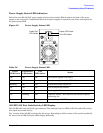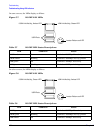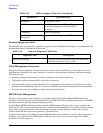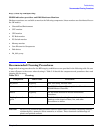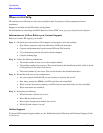
Chapter 5
Troubleshooting
Diagnostics
130
General Diagnostic Tools
The following tools are currently available for support on other HP 9000 and Integrity server platforms. The
distribution method is through the HP website.
Fault Management Overview
The goal of fault management and monitoring is to increase server availability, by moving from a reactive
fault detection, diagnosis, and repair strategy to a proactive fault detection, diagnosis, and repair strategy.
The objectives are:
• To detect problems automatically, as close as possible to the time of occurrence.
• To diagnose problems automatically, at the time of detection.
• To automatically report (in understandable text) a description of the problem, the likely cause(s) of the
problem, the recommended action(s) to resolve the problem, and detailed information about the problem.
• To ensure that tools are available to repair or recover from the fault.
HP-UX Fault Management
Proactive fault prediction and notification is provided on HP-UX by SysFaultMgmt WBEM indication
providers, as well as by the Event Management Service (EMS). The Event Management Service and WBEM
provide frameworks for monitoring and reporting events.
SysFaultMgmt WBEM indication providers and the EMS Hardware Monitors allow users to monitor the
operation of a wide variety of hardware products, and alert them immediately if any failure or other unusual
event occurs. By using hardware event monitoring, users can virtually eliminate undetected hardware
failures that could interrupt server operation or cause data loss.
Complete information on installing and using EMS hardware event monitors, as well as a list of supported
hardware, can be found in the EMS Hardware Monitors Users Guide. An electronic copy of this book is
available on the HP website at:
DISKEXPT Disk Expert Utility
IODIAG I/O Diagnostics Launch Facility (Executes
third party diagnostics and runs BIST, if
available)
CIODIAG2 Core I/O Diagnostic
Specific Card I/O
Diagnostics
Card-Specific I/O Diagnostics/BIST
Table 5-12 General Diagnostic Tools List
Diagnostic Tool Description
IPMI Event Decoder Provides detailed information about the IPMI event
(Problem description, cause, action)
Table 5-11 Offline Support Tools List (Continued)
Offline Tool Functional Area




